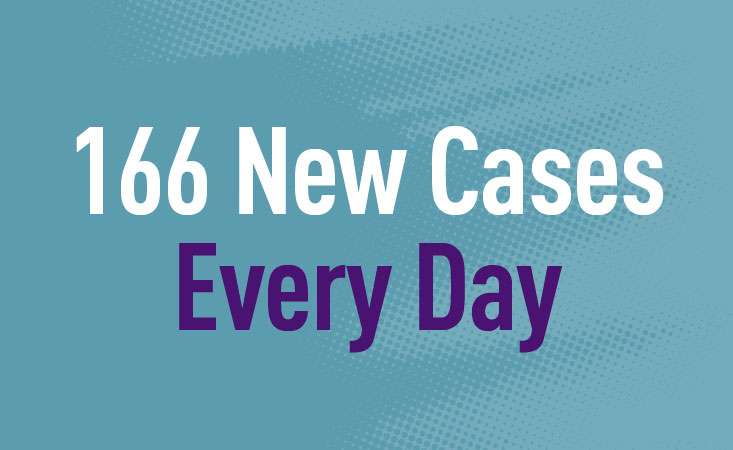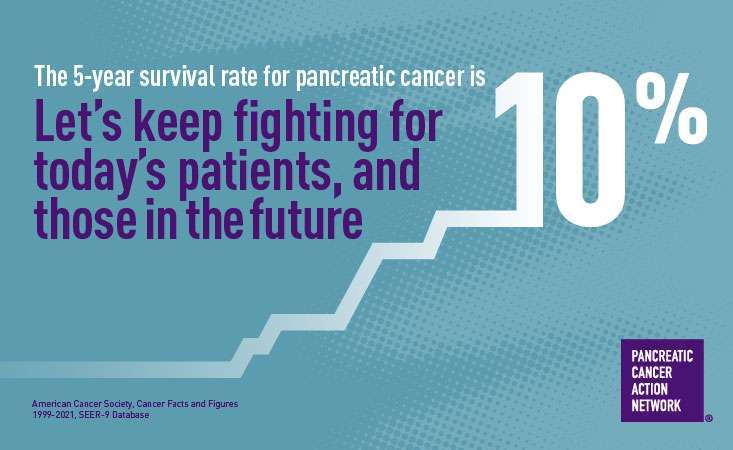
Every day in 2021, 166 Americans will learn that they have pancreatic cancer.
That’s 60,430 people who are predicted to be diagnosed with pancreatic cancer in this country this year, according to the latest American Cancer Society (ACS) Cancer Facts & Figures report, released today.
This marks a 5% increase over last year’s estimate.
The report also states that the pancreatic cancer five-year survival rate remains at 10%, the same rate that just last year reached double digits for the first time.
When interpreting the survival rate reported in this year’s Facts & Figures, it’s important to note that the data represents patients diagnosed between 2010 and 2016, followed through 2017. We don’t know exactly how patients diagnosed today may fare, either individually or collectively – but we are confident that our efforts continue to improve and extend patient lives.
“We are very grateful to ACS for gathering, analyzing and publishing these data every year,” said Julie Fleshman, JD, MBA, president and CEO of PanCAN. “But we know that these aren’t just statistics; these numbers represent our friends, family members, colleagues and neighbors.”
PanCAN’s vision is to create a world in which all patients with pancreatic cancer will thrive – including people who already have the disease and those who haven’t yet been diagnosed. Our PanCAN Patient Services team is here for everyone affected by pancreatic cancer, from patients and caregivers to family members and healthcare professionals who diagnose and treat pancreatic cancer patients.
Where We Are Today
2020 was a year unlike any we’ve experienced before. The impact of the coronavirus pandemic on all aspects of society – including on cancer diagnoses and deaths – remains to be seen.
But even in the midst of the pandemic, there is hope.
PanCAN is committed to providing reliable, personalized, free information and resources to patients, families and healthcare professionals. And even during a pandemic, we were able to offer uninterrupted support and services to our community because of you – our dedicated donors and fundraisers.
One of those critical resources is PanCAN’s Know Your Tumor® precision medicine service, which provides patients and their healthcare teams with testing to reveal their unique biology. This information can help guide personalized treatment options for the patient, which has been shown to help patients live longer.
“We’re extremely proud that our program showed for the first time a clear survival advantage to a precision medicine approach for pancreatic cancer patients,” Fleshman said.
“The most important takeaway from these findings is that patients won’t know if there are treatments that align with their biology unless they get tested. We and other organizations strongly recommend all pancreatic cancer patients get biomarker testing of their tumor tissue and genetic testing for inherited mutations to determine the best treatment options for them.”
Patients knowing all their treatment options – including standards of care, treatments matched to their biology and clinical trials – is one way to improve the current 10% survival rate.

Where We’re Going
To further increase the pancreatic cancer survival rate, we’ll need to learn how to diagnose the disease earlier and better treat it.
PanCAN is committed to taking on both challenges through our large-scale clinical initiatives, made possible by our generous donors and supporters.
PanCAN’s Precision PromiseSM, which opened for patient enrollment in 2020, is working to develop new pancreatic cancer treatments faster and less expensively than standard clinical trials.
Eligible patients with metastatic pancreatic cancer can enroll at sites throughout the U.S. In addition to testing experimental therapies and combinations, Precision Promise will also evaluate supportive care measures to define best practices. Supportive care helps maintain and improve patients’ quality of life, which can lead to longer survival.
In addition to working toward better treatment options and quality of life, PanCAN will introduce its newest project, an Early Detection Initiative, this year.
PanCAN’s Early Detection Initiative will determine whether people with a new diagnosis of diabetes alongside other clinical features would benefit from screening tests for pancreatic cancer. The aim is to diagnose the disease at its early stages – when the tumor is surgically removable – in patients who are screened through the study.
A longer-term goal of the study will be to identify blood-based biomarkers, through a partnership with the National Cancer Institute, that can help find which individuals are at highest risk for developing or already having pancreatic cancer.
“PanCAN’s Precision Promise and Early Detection Initiative aim to transform the way pancreatic cancer is detected, diagnosed, treated and managed now and into the future,” Fleshman said.
“In partnership with our amazing volunteers, advocates, donors and the healthcare and research communities, we are committed to improving the lives of everyone impacted by this disease and are here to support the more than 60,000 people who will be diagnosed with pancreatic cancer this year in our country.”
















